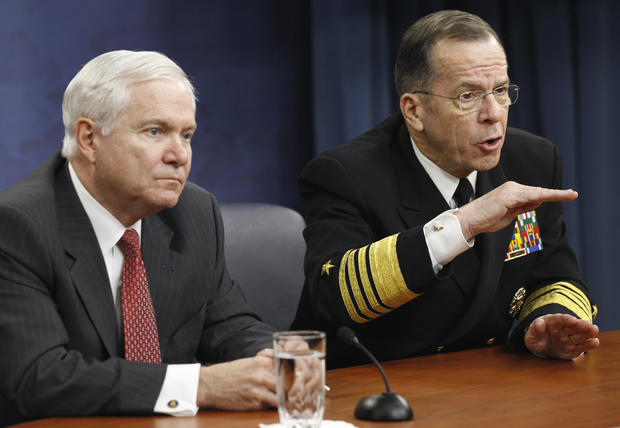Gates: Mideast events "extraordinary setback for al Qaeda"
The revolutions in Tunisia and Egypt - and the mostly peaceful protests against autocratic regimes elsewhere in the Middle East - represent major setbacks for the extremist ideologies of al Qaeda and the Iranian government, Defense Secretary Robert Gates said Tuesday.
"I'm an optimist about these changes," Gates said. "I think [they] are an extraordinary setback for al Qaeda. It basically gives the lie to al Qaeda's claims that the only way to get rid of authoritarian governments is through extremist violence."
Gates said that the revolutions were also "a major setback for Iran" because the restraint of the Egyptian and other militaries "contrasts vividly" with Iran's typically violent response to anti-government protests.
Gates spoke at a joint press conference with Adm. Michael Mullen, chairman of the Joint Chiefs of Staff.
Mullen just returned from a weeklong tour of the Middle East, which, though long-planned, "took on a fresh character" in light of recent events, he said.
"The course of events are moving literally at the speed of Twitter," he said, adding that "the U.S. military will not lighten our load, will don't dull our focus" in the region.
Gates reiterated the government's position that all options - including military intervention - are on the table in responding to autocratic leader Muammar Qaddafi's violence against protesters in Libya. But Gates took a cautious approach, noting that any military response would have complex consequences and ripple effects for U.S. interests.
"All of the options beyond humanitarian assistance and evacuations are complex. ... If we move additional assets, what are the consequences of that for Afghanistan? For the Persian Gulf? And what other allies are prepared to work with us in some of these things?" Gates said. "We also have to think about, frankly, the use of the U.S. military in another country in the Middle East."
He noted that the U.N. Security Council's resolution regarding Libya does not authorize the use of military force, adding only that the Defense Department is working to "provide the president with a range of options."
